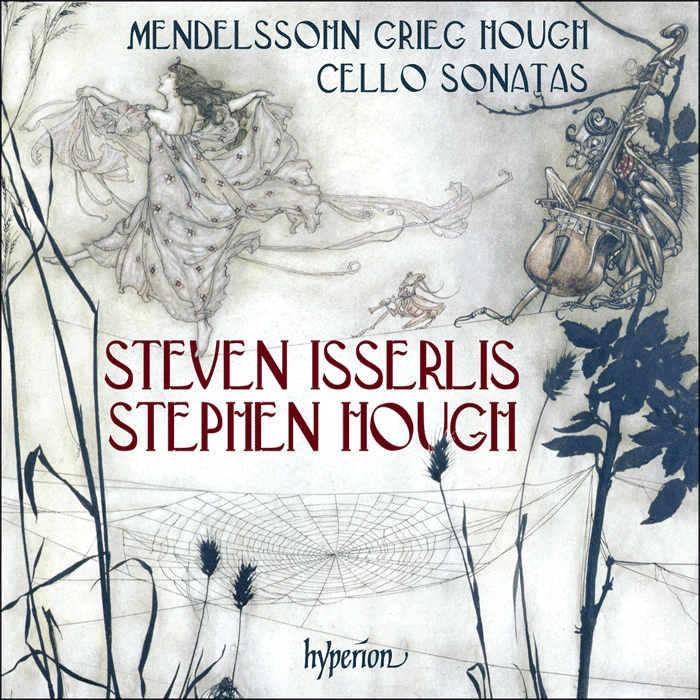GRIEG; HOUGH; MENDELSSOHN Cello Sonatas
View record and artist detailsRecord and Artist Details
Composer or Director: Stephen Hough, Edvard Grieg, Felix Mendelssohn
Genre:
Chamber
Label: Hyperion
Magazine Review Date: 07/2015
Media Format: CD or Download
Media Runtime: 71
Mastering:
DDD
Catalogue Number: CDA68079

Tracks:
| Composition | Artist Credit |
|---|---|
| Sonata for Cello and Piano |
Edvard Grieg, Composer
Edvard Grieg, Composer Stephen Hough, Composer Steven Isserlis, Cello |
| Sonata for Cello and Piano left hand 'Les adieux' |
Stephen Hough, Composer
Stephen Hough, Composer Steven Isserlis, Piano |
| Sonata for Cello and Piano No. 2 |
Felix Mendelssohn, Composer
Felix Mendelssohn, Composer Stephen Hough, Composer Steven Isserlis, Cello |
Author: Harriet Smith
Isserlis and Hough balance the urgency of the opening theme of Grieg’s glorious sonata with a luminous reading of the rhapsodic second idea and everywhere their reading glints with conviction. Hough sets a slightly faster pace in the second movement than Pascal Amoyel for Bertrand (another exceptionally fine interpretation), and Isserlis is matchless in the way he tugs at the simple melody to heart-rending effect. The cellist is also deeply moving in the solo opening of the third movement before the lively Halling bursts in.
Isserlis has previously recorded Mendelssohn’s Second Sonata with the fortepianist Melvyn Tan. Now his range of colours is wider still, his intensity more unfettered, and everywhere you have the sense that he and Hough are egging one another on, unafraid to take risks. The slow movement is a thing of beauty, with all the yearning that you’d expect but also a freedom that Hough sets up beautifully in his finely nuanced opening soliloquy. It’s more rhetorical than Huw Watkins or Larry Todd, and Isserlis’s sense of impassioned yearning is even more affecting than Paul Watkins and a great deal more palatable than the histrionic sobbing tone of Mischa Maisky. We’re also reminded of Hough’s great affinity for Mendelssohn (remember those concerto recordings from 15 years ago?) in the way he can combine airiness of texture and brilliance of articulation while moving at speed, and the finale is one of the most exuberant on disc.
In between we get Hough’s own Sonata for cello and piano left hand, a work whose single movement has three distinct sections. Its nickname of Les adieux refers not only to Beethoven’s sonata of that name but also to Dussek’s, while the marking of Im Legendenton over the second part refers us back to Schumann. It’s unafraid to breathe an air of nostalgia – making it a good companion to the other sonatas here – but the results are refreshingly personal. One of the sonata’s most fascinating aspects is the close interplay between the two protagonists, their lines often entwined, with the piano frequently leading the way, drawing the cello up into the treble register. The second section has a hypnotic, slightly Eastern quality to its lines, while the rapt final section hovers, shimmers and finally achieves stasis, the cello returning to the pizzicato of the outset, now resolved on its lowest note. The performance couldn’t be more persuasive and the two players are beautifully recorded, with Isserlis providing typically engaging notes.
Discover the world's largest classical music catalogue with Presto Music.

Gramophone Digital Club
- Digital Edition
- Digital Archive
- Reviews Database
- Full website access
From £8.75 / month
Subscribe
Gramophone Full Club
- Print Edition
- Digital Edition
- Digital Archive
- Reviews Database
- Full website access
From £11.00 / month
Subscribe
If you are a library, university or other organisation that would be interested in an institutional subscription to Gramophone please click here for further information.




